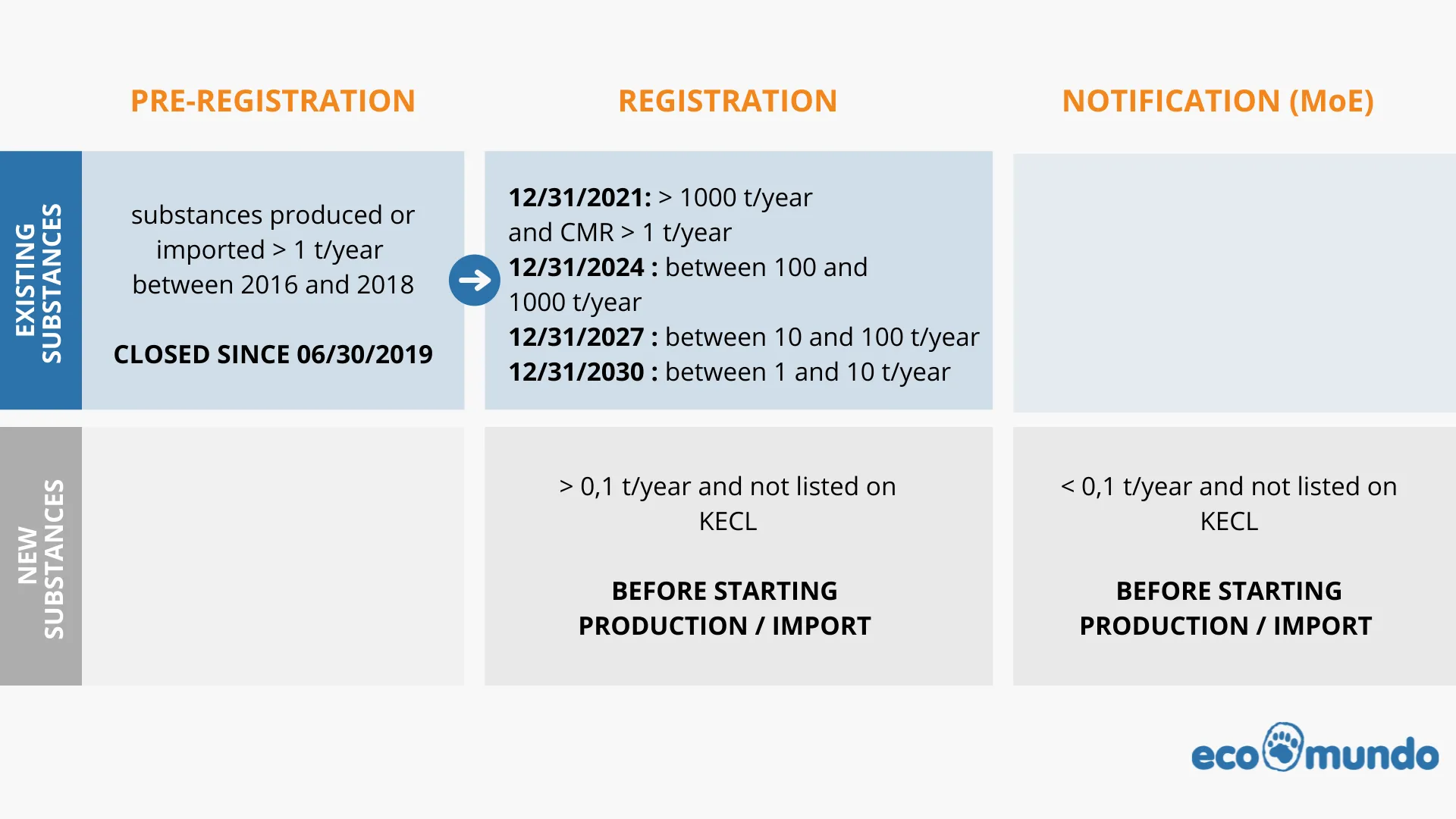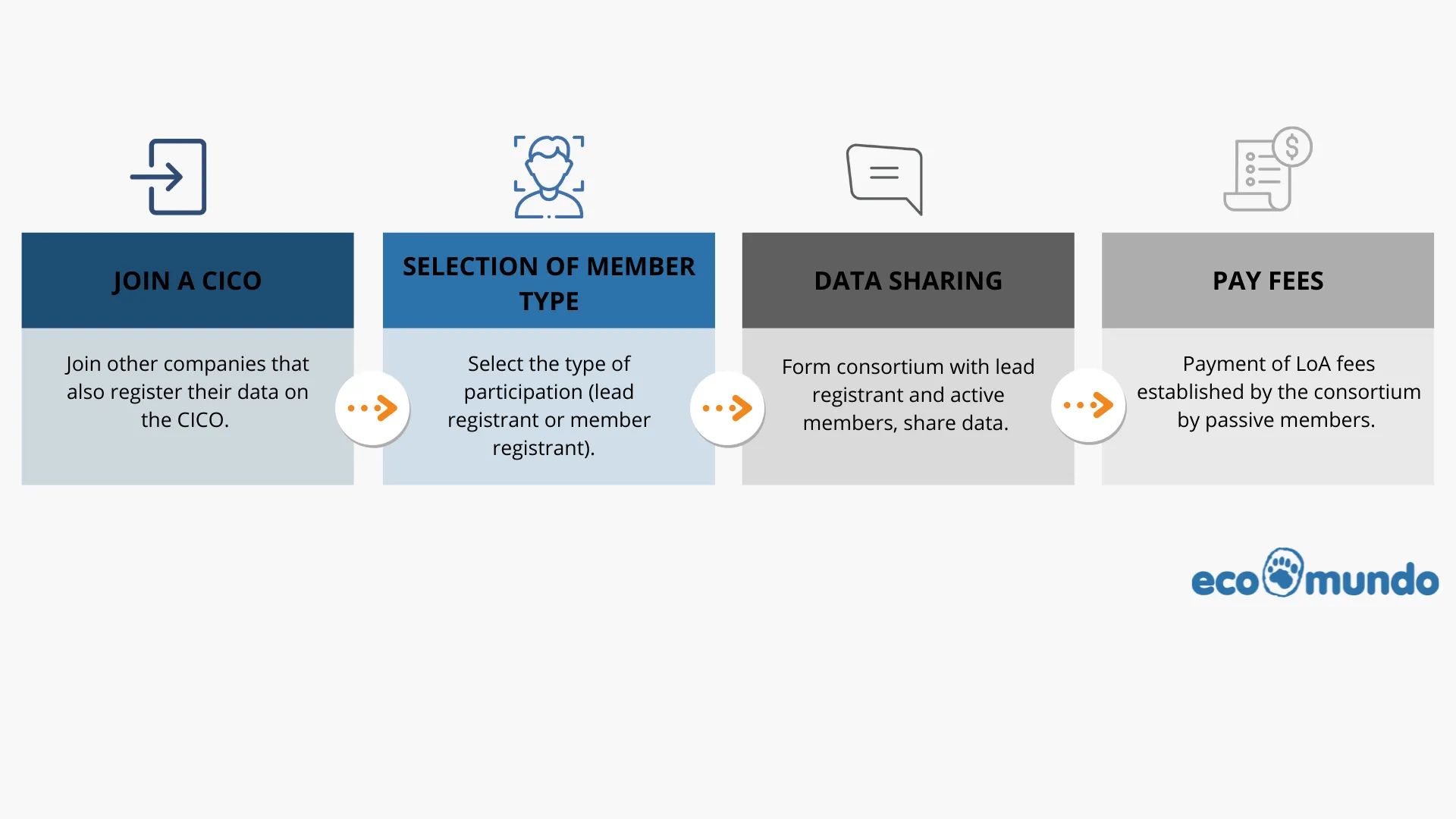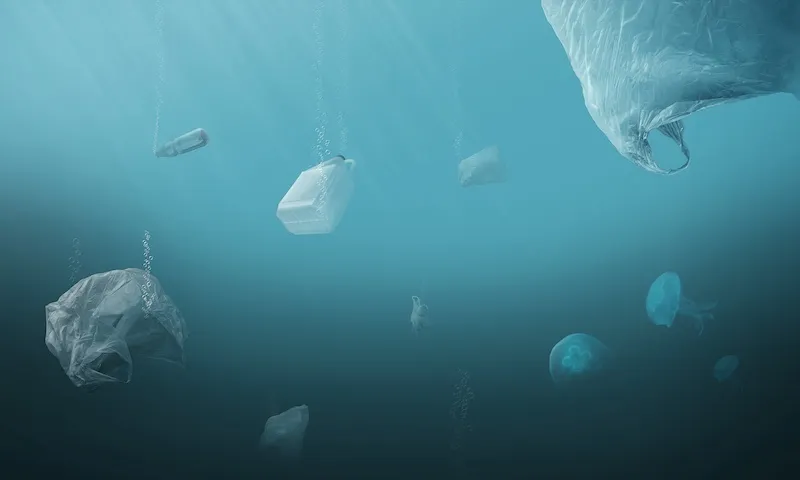Revision of K-REACH - First deadline for full registration of substances is December 31, 2021

Deadlines for the registration of pre-registered substances under K-REACH
The Act on the Registration and Evaluation of Chemicals in South Korea (more commonly known as K-REACH), has been submitted to several amendments in 2018 that took effect on January 1st, 2019. This new version of K-REACH includes the registration of all chemical substances produced or imported into South Korea in quantities greater than one ton per year.
Under this revised version of K-REACH, chemicals produced or imported in greater quantities than one ton per year between 2016 and 2018, had to be pre-registered between January 1st and June 30th, 2019.
Companies that pre-registered their substances were given a grace period to complete the final registration of the substances within certain time limits, defined by the tonnage band and the hazardousness of the substances:
- 12/31/2021 for substances exceeding 1000 tons/year; and CMR substances (Carcinogenic, Mutagenic or Reprotoxic) exceeding 1 T/year,
- 12/31/2024 for substances between 100 and 1000 T/year,
- 12/31/2027 for substances between 10 and 100 T/year,
- 12/31/2030 for substances between 1 and 10 T/year.

Any company that has not registered the substances concerned by the first deadline of December 31st, 2021 will be forced to suspend its commercial activities with South Korea from January 1st, 2022.
Planning on putting new substances on the Korean market?
All substances imported or produced in quantities greater than 0.1 ton per year and not listed on the KECL list must be registered directly, prior to manufacture or import, without pre-registration or a grace period.
Below 0.1 ton per year, it is only required to notify the new substance to the Ministry of the Environment (MoE).
For companies based outside South Korea, registration of new substances requires the use of an Only Representative (OR) established in South Korea and certified by the government. As of 2019, EcoMundo's Korean office is certified as an Only Representative by the government and is therefore able to conduct registrations.
How does K-REACH registration work?
K-REACH registration files contain all the information needed to evaluate a chemical substance for validation by the Korean authorities. For both pre-registered and new substances, several steps are necessary before the final submission of the registration file:

1. Join a CICO
In order to simplify data collection and avoid duplication, companies that are registering their substances are invited to cooperate with each other through the CICO (Chemical substance Information Communicative Organisation). This exchange space, similar to the European SIEF (Substance Information Exchange Forum), allows the different actors to carry out a joint registration and to collaborate together for the submission of the file.
2. Selection of member type
Within CICO, K-REACH distinguishes three types of members:
- Lead registrant: He is in charge of managing the consortium, identifying the substance, collecting the data, providing the chemical safety report and the data gap analysis and submitting the dossier.
- Active members: They participate in the management of the consortium and share the costs among themselves and with the lead registrant.
- Passive members: They have no obligations but must purchase the LoA (Letter of Access) to have access to data already established by other members.
Regarding companies using a OR, the OR can take on an active or passive member role, but cannot be a lead registrant. If you want to have more control over the registration file, EcoMundo recommends you to choose the active member role.
3. Form a consortium and share data
Once the roles have been selected, a consortium composed of the lead registrant and the active members is created. The consortium members must then gather all the data requested by the Ministry of the Environment (the quantity and type of data required vary according to the tonnage band). Once all the information is gathered, the lead registrant submits the final file and completes the registration.
4. Pay the fees
The consortium calculates the cost of the LoA (Letter of Access) based on the costs associated with the constitution of the registration file and the number of members in the CICO. Passive members must then buy the LoA to have access to the data established by the consortium and to finalize the registration act.
Once the dossier is completed and the fees paid, NIER (National Institute of Environmental Research) will conduct a thorough evaluation of the shared data to determine whether the registered substance will be allowed, restricted or banned in South Korea.
EcoMundo accompanies you
You need to register a new substance in your portfolio in Korea? EcoMundo�s experts in Paris and Seoul will carry out the registration of your substances from start to finish and provide you with a precise estimate of the Registration budget.
Download our white paper to learn all about K-REACH: by clicking here
Wish to know more about K-REACH ?
For more information, do not hesitate to contact one of our experts!
Deadlines for the registration of pre-registered substances under K-REACH
The Act on the Registration and Evaluation of Chemicals in South Korea (more commonly known as K-REACH), has been submitted to several amendments in 2018 that took effect on January 1st, 2019. This new version of K-REACH includes the registration of all chemical substances produced or imported into South Korea in quantities greater than one ton per year.
Under this revised version of K-REACH, chemicals produced or imported in greater quantities than one ton per year between 2016 and 2018, had to be pre-registered between January 1st and June 30th, 2019.
Companies that pre-registered their substances were given a grace period to complete the final registration of the substances within certain time limits, defined by the tonnage band and the hazardousness of the substances:
- 12/31/2021 for substances exceeding 1000 tons/year; and CMR substances (Carcinogenic, Mutagenic or Reprotoxic) exceeding 1 T/year,
- 12/31/2024 for substances between 100 and 1000 T/year,
- 12/31/2027 for substances between 10 and 100 T/year,
- 12/31/2030 for substances between 1 and 10 T/year.

Any company that has not registered the substances concerned by the first deadline of December 31st, 2021 will be forced to suspend its commercial activities with South Korea from January 1st, 2022.
Planning on putting new substances on the Korean market?
All substances imported or produced in quantities greater than 0.1 ton per year and not listed on the KECL list must be registered directly, prior to manufacture or import, without pre-registration or a grace period.
Below 0.1 ton per year, it is only required to notify the new substance to the Ministry of the Environment (MoE).
For companies based outside South Korea, registration of new substances requires the use of an Only Representative (OR) established in South Korea and certified by the government. As of 2019, EcoMundo's Korean office is certified as an Only Representative by the government and is therefore able to conduct registrations.
How does K-REACH registration work?
K-REACH registration files contain all the information needed to evaluate a chemical substance for validation by the Korean authorities. For both pre-registered and new substances, several steps are necessary before the final submission of the registration file:

1. Join a CICO
In order to simplify data collection and avoid duplication, companies that are registering their substances are invited to cooperate with each other through the CICO (Chemical substance Information Communicative Organisation). This exchange space, similar to the European SIEF (Substance Information Exchange Forum), allows the different actors to carry out a joint registration and to collaborate together for the submission of the file.
2. Selection of member type
Within CICO, K-REACH distinguishes three types of members:
- Lead registrant: He is in charge of managing the consortium, identifying the substance, collecting the data, providing the chemical safety report and the data gap analysis and submitting the dossier.
- Active members: They participate in the management of the consortium and share the costs among themselves and with the lead registrant.
- Passive members: They have no obligations but must purchase the LoA (Letter of Access) to have access to data already established by other members.
Regarding companies using a OR, the OR can take on an active or passive member role, but cannot be a lead registrant. If you want to have more control over the registration file, EcoMundo recommends you to choose the active member role.
3. Form a consortium and share data
Once the roles have been selected, a consortium composed of the lead registrant and the active members is created. The consortium members must then gather all the data requested by the Ministry of the Environment (the quantity and type of data required vary according to the tonnage band). Once all the information is gathered, the lead registrant submits the final file and completes the registration.
4. Pay the fees
The consortium calculates the cost of the LoA (Letter of Access) based on the costs associated with the constitution of the registration file and the number of members in the CICO. Passive members must then buy the LoA to have access to the data established by the consortium and to finalize the registration act.
Once the dossier is completed and the fees paid, NIER (National Institute of Environmental Research) will conduct a thorough evaluation of the shared data to determine whether the registered substance will be allowed, restricted or banned in South Korea.
EcoMundo accompanies you
You need to register a new substance in your portfolio in Korea? EcoMundo�s experts in Paris and Seoul will carry out the registration of your substances from start to finish and provide you with a precise estimate of the Registration budget.
Download our white paper to learn all about K-REACH: by clicking here
Wish to know more about K-REACH ?
For more information, do not hesitate to contact one of our experts!







